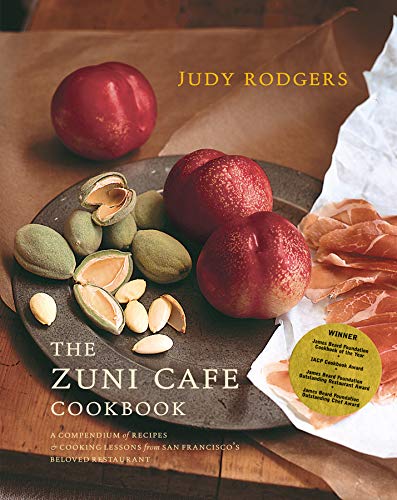-
Shop
- Back
- Shop
- Pre-Order Books
- New Releases
- Vintage Books
- Sale Books
- Children's
- Shop All
- Vintage Menus
- Risographs
- Aprons & Totes
- Moulds
- Gift Cards
- Americas
- Art & Design
- Asia & Oceania
- Europe
- Jewish
- Middle Eastern & African
- Baking & Sweets
- Drinks
- Food Writing
- Gardening & Preserving
- General & Ingredients
- Health
- Professional
- Technique
- Magazine
- Upcoming Events
- About Us
- Cookbook Club
-
Shop
- Pre-Order Books
- New Releases
- Vintage Books
- Sale Books
- Children's
- Shop All
- Vintage Menus
- Risographs
- Aprons & Totes
- Moulds
- Gift Cards
- Americas
- Art & Design
- Asia & Oceania
- Europe
- Jewish
- Middle Eastern & African
- Baking & Sweets
- Drinks
- Food Writing
- Gardening & Preserving
- General & Ingredients
- Health
- Professional
- Technique
- Magazine
- Upcoming Events
- About Us
- Cookbook Club



The Zuni Cafe Cookbook: A Compendium of Recipes and Cooking Lessons from San Francisco's Beloved Restaurant (Judy Rodgers)
FROM CELIA SACK (OMNIVORE BOOKS NEWSLETTER, SEPTEMBER 2019:
I've been thinking a lot about a question I get a lot in my shop. No, not "Do you like to cook?," to which I now answer, "This would be a very depressing job if I hated cooking." Customers often wonder what my favorite cookbook is, and my answer is consistent: The Zuni Cafe Cookbook. The author, Judy Rodgers, tells you why you're doing what you're doing in the kitchen in a poetic yet concise way. Looking it over again recently, as Paula toiled away making the pappa al pomodoro (p.164), I thought more deeply about what makes this the best cookbook ever written. The answer is, it offers the keys to cooking. Not only does one learn why they're doing something (example: store a whole chicken uncovered in your fridge for two days before roasting it, so the skin will crisp up perfectly), but they learn the science - the alchemy - behind it.
Take Rodgers' advice on "sweating," (from the recipe for that pappa al pomodoro) which makes a food like tomatoes release and then cook in its own moisture. She writes, "Sweating is most efficiently accomplished by crowding the food in a straight-sided pan, which restricts evaporation (using a deeper pot or covering it will restrict it further), and cooking over low heat. That way the cell walls slowly collapse and expel moisture, which falls back on them, preventing the sugars from caramelizing and fats or proteins from coloring. The liquid becomes part of the cooking medium...Sweating is generally a quiet operation; if the food is whispering, or worse, hissing, the moisture is probably evaporating too rapidly..." This is knowledge I can now apply to any cookbook, and it helps me understand why I want to crowd the pan if I want to sweat something. But her voice is singular. To describe the sound the food should make during cooking is where the poetry comes in, and these kinds of anecdotes are found throughout the book.
A personal memory: back in 2009, I had no idea how to contact Ms. Rodgers to ask her to come give a talk at Omnivore, so I hand-wrote her a letter. She graciously answered, and came to speak at the shop; her cooking wisdom was a huge loss to the world when she died of cancer in 2013. We are lucky to have her cookbook, and if it's not in your kitchen, consider adding it.
